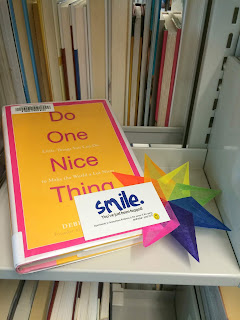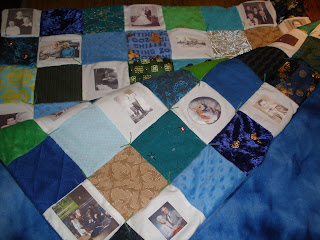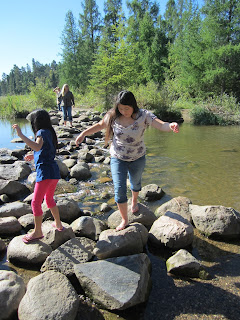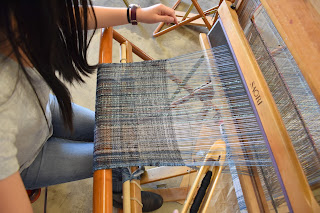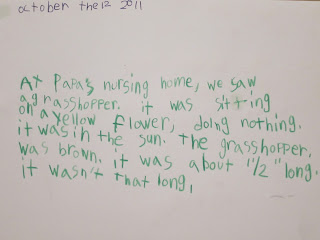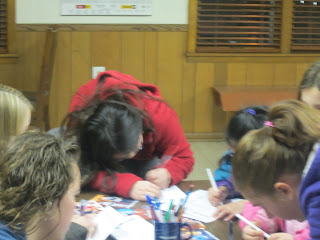The next spiritual practice in the alphabetical series is Kindness. There are many great insights and ideas from
Spirituality and Practice that are below.
Spiritual Practices: Kindness
Enhances: Generosity
Balances/Counters: Selfishness
The Basic Practice
Kindness is the first of the three great treasures advocated by Lao Tzu. The Buddha taught that generosity is a primary quality of an awakened mind. Jewish and Christian ethics are built upon deeds of kindness, as are the daily interactions of people of primal traditions.
The spiritual practice of kindness encompasses a range of small acts and habits that we know as old-fashioned good manners — saying "please" and "thank you,"
lending a helping hand, cheering someone up with a smile, or waiting your turn. It applies not just to your relationships with other people. Etiquette in the spiritual life extends to animals, plants,
things, and the Earth.
Spreading kindness at the library.
(Taken on June 14, 2014.)
This practice also means being generous with your presence, time, and money. Give freely without expecting anything in return. Kindness is never a quid pro quo endeavor.
Why This Practice May Be For You
Few people would describe themselves as unkind, cruel, or nasty, yet we often miss the mark on this spiritual practice. Simply remember the many times you have been hurt by someone not doing something: the call that didn't come when you were feeling low, the thank you note that never appeared, the missed appointment. Now, consider how often you have neglected to act in similar circumstances. Kindness is very susceptible to the sin of omission.
Still, acknowledging that we have missed another's kindness can make us want to be kind more consistently ourselves. This is one of those situations when a negative experience has a positive outcome.
Sophia and Olivia packing up pillows to
donate to a homeless shelter.
(January 27, 2011.)
Of course, sometimes we are simply too self-absorbed to notice that we are not being kind. Selfishness quickly undermines manners. Generosity, as well, is difficult for both the miser and the glutton.
Quotes
If the earth does grow inhospitable toward human presence, it is primarily because we have lost our sense of courtesy toward the earth and its inhabitants.
— Thomas Berry quoted in
Rummaging for God by Melannie Svoboda
Appreciative words are the most powerful force for good on the earth.
— George W. Crane quoted in
Full Esteem Ahead by Diane Loomans
Kindness trumps greed: it asks for sharing. Kindness trumps fear: it calls forth gratefulness and love. Kindness trumps even stupidity, for with sharing and love, one learns.
— Marc Estrin quoted in
Prayers for a Thousand Years edited by Elizabeth Roberts and Elias Amidon
Taking a tour of a food shelf and learning ways to help.
(Taken on March 19, 2012)
Be kind to people whether they deserve your kindness or not. If your kindness reaches the deserving, good for you; if your kindness reaches the undeserving, take joy in your compassion.
— James Fadiman and Robert Frager in
Essential Sufism
The kindnesses of others fertilize our soul, they become a part of who we are, and we carry them and their love. We feel this when people die, how their gifts remain alive in us.
— Wayne Muller in
How, Then, Shall We Live?
If there is any kindness I can show, or any good thing I can do to any fellow being, let me do it now, and not defer or neglect it, as I shall not pass this way again.
— William Penn quoted in
Lent by Megan McKenna
Books
I read the book
How We Behave at the Feast by Dwight Currie which is essentially a book of weekly reflections. Although it is set up like this, I read it in a couple of days instead. These are things I want to remember:
- "...he comes as a guest to the feast of existence, and knows that what matters is not how much he inherits, but how he behaves at the feast, and what people remember and love him for" (from an essay by Boris Pasternak in which he voiced his hope for the youth of the post World War II era).
- "Where there is too much, something is missing" (an old Jewish saying).
- "The hope of the world lies in what one demands, not of others, but of oneself." (James Baldwin)
- "Mothers are the peacemakers who, by their example, teach us that compromise doesn't mean that we have failed. Mothers are the providers who, by their own sacrifice, show us that sharing doesn't mean we'll have less. And mothers are the judges, far wiser than Solomon, who cannot love one child more than the others but can still bless all children with a love of their own."
Mom sewing a communion dress for one of the girls.
(Taken on November 18, 2009.)
- On going to have picnics at a gravesite: "Often they cried, but just as often they would laugh. Most of their memories were good ones. They felt very comfortable there, and, consequently, so did I. It was a nice place for a picnic."
My dad and mom's grave. This is my dad's side.
(Taken on May 28, 2018.)
- As long as we remember and celebrate the lives of those who are gone, our feast is in no way diminished. We will not dine with an empty chair if we choose instead to have a picnic with our memories."
- "The great secret...is not having bad manners or good manners or any other particular sort of manners, but having the same manner for all human souls: in short, behaving as if you were in Heaven, where there are no third-class carriages, and one soul is as good as another." (George Bernard Shaw,
Pygmalion)
- The next time you find yourself dining on someone's reputation, snacking on someone's feelings, or enjoying a steady diet of nothing except stories about yourself, remember you are talking with your mouth full."
- If you need to say you are sorry, say it - then accept the forgiveness that is given. If you need to end a relationship or to recover from a lost love, then do it with honesty, compassion, and grace. If your dreams are dashed, close your eyes and pray for new visions. At the same time, you must wait and watch for the next invitation. One will always come. The trouble is, you won't know you've received it if you're still mired in regrets and remorse.
- When you write a letter, it is an act of faith that there is a friend out there, a confirmation that you are never alone. A letter is always welcome. Not even e-mail or faxes (though decidedly faster and more immediate) are as satisfying and rewarding as finding a letter in your mailbox - the stationery, the hand-addressed envelope. A tangible object was created only for you, it has traveled the miles to overcome time and space, and it is now in your hand. It is a letter from a friend.
- Names are given to children at birth. The gift of a name comes with all the love and all the hope that new life inspires. Names have beginnings.
My mom, dad, and godmother coming out of
St. Bridget's Catholic Church in Minneapolis
on my baptismal day.
(Taken in Summer 1966.)
- To know people's names is to acknowledge their humanity, to listen to their stories, and to share in their future.
- "For where your treasure is, there will your heart be also." (Jesus)
- We must take responsibility for our own mistakes and misdeed just as we take delight in our success and achievements.
- Charity derives from the same Latin word as cherish, caress, and care. And
care rhymes with
share. So, when you think of charity, you should think of what it means to care enough to share what you can spare of your cherished fare.
- We all have our quirks. And our quirks become habits, and our habits become routines, and our routines turn into the rituals that become as sacred as religious traditions. It's how we deal with the passage of time.
- Our habits save time. Our routines preserve time. Our rituals re-create time. Our traditions honor time.
Christmas has always involved having a manger set up,
Christmas stockings hung by the fireplace,
a decorated tree, and presents.
This is me on my first Christmas - almost six months old.
(Taken on December 25, 1966.)
- Rituals get us started and traditions show us the way.
- We need to honor and respect all the ruts, routines, and rituals that people employ as they travel down the road of life. The ruts give them comfort, the routines keep them young, and the rituals remind them that they are not alone.
- The Ark Project is a crusade to save those savory foods that definitely take longer to prepare than they do to consume. You have to create an Ark Project all your own. You have to savor all the old family recipes that will feed and nourish you for a lifetime. The joy, the caring, and the love is in the preparation. Do good by eating - and living - well.
My 52nd birthday dinner made on the grill:
steak with onions and mushrooms; and Brussels sprouts.
(Taken on June 29, 2018.)
- The second book that I read,
Heart, was written by Gail Godwin. The book takes us on a journey of ideas, stories, and anecdotes about the heart beginning with the oldest artistic representation of the heart on a Spanish cave wall in 10,000 B.C. to the most recent books on the subject by the Dalai Lama, Thomas Keating, and Paul Pearsall.
Film
Babe: Pig in the City is a movie that focuses on kindness through an animal that herds sheep by practicing courtesy and empathy. Now Babe again comes across as a great exemplar of kindness. He is generous and self-sacrificing.
Music
The song
Get Together by Chet Powers, was made famous by The Youngbloods. I didn't know the name of this song even though I've heard it many times. The minute I heard it, it brought back good memories of simpler times. Happy times. As Spirituality and Practice said, this song "gives us the key to kindness — smiling on our brothers and trying to love one another right now."
In
Bridge Over Troubled Water by Simon and Garfunkel, the singer goes even further. As Spirituality and Practice said, "He promises to always be there, like a bridge over troubled water, when you are weary, feeling small, down and out, on the street, and even when your time has come to shine. Here kindness is easing the mind."
When you're weary, feeling small
When tears are in your eyes, I'll dry them all (all)
I'm on your side, oh, when times get rough
And friends just can't be found
Like a bridge over troubled water
I will lay me down
Like a bridge over troubled water
I will lay me down
When you're down and out
When you're on the street
When evening falls so hard
I will comfort you (ooo)
I'll take your part, oh, when darkness comes
And pain is all around
Like a bridge over troubled water
I will lay me down
Like a bridge over troubled water
I will lay me down
Sail on silver girl
Sail on by
Your time has come to shine
All your dreams are on their way
See how they shine
Oh, if you need a friend
I'm sailing right behind
Like a bridge over troubled water
I will ease your mind
Like a bridge over troubled water
I will ease your mind
This is kind of a sad/comforting song to listen to - more like one that you would hear if you were going through a very challenging time in your life or if someone died.
Both of these songs were written during the hippie era. Maybe that's why I like them. Simple messages. Comforting. Insightful. Songs I could listen to again and again.
Art
Mexican artist Diego Rivera shows the oppression and nobility of the poor through his paintings. In
The Flower Carrier, a kneeling man is burdened by a large basket of flowers on his back. A woman lends support, adjusting the balance of the load. Although it is a small act, it is both helpful and kind.
It reminds me of some of the men and women on the street in China carrying heavy or large loads on their backs or bikes. Having someone to lighten one's load, to provide that support - even in the smallest ways - can make such a tremendous difference for the person who is struggling.
Daily Cue, Reminder, Vow, Blessing
I haven't done these cues or reminders. However, I want to keep them here because I may use them in the future:
• Watering my houseplants is a cue for me to expand my practice of kindness to animals and inanimate beings.
Cooper looking out the window at the backyard.
Lots of plants and fresh-canned strawberry jam are on the counter.
(Taken on June 26, 2014.)
• Watching someone give up their seat to an elderly person is a reminder for me to make the little kind gestures.
• Knowing how nice it is to receive compliments, I vow to praise someone as an act of kindness today.
Practice of the Day
The Buddha taught lay people the virtue of making the "seven offerings that cost nothing": . . . a compassionate eye, a smiling face, loving words, physical service, a warm heart, a seat, and lodging.
— Jiko Kohno in
Right View, Right Life
To Practice This Thought: Make one of the seven offerings that cost nothing.
Olivia on horseback doing therapeutic horseback riding.
(Taken on August 21, 2007.)
Journal Exercises
This is an interesting idea that I would like to start doing at some point:
Write a portrait of "The Kindest Person I Know," including specific examples of this person's kind deeds.
Tristine Rainer in
The New Diary makes an interesting observation about the value of writing portraits, especially of someone you admire: "By writing diary portraits of people who intrigue you, you enter their qualities in your book, in your space, and begin the process of recognizing and taking possession of those qualities."
Discussion Questions, Storytelling, Sharing
• Giving to others is one part of the spiritual practice of kindness. Another is being able to receive graciously the gifts of others. Which are you better at? Why?
Without going into a lot of detail, I would say that I am much better at giving to others and being kind. I enjoy thinking of ways that I can be of service and be helpful.
Receiving gifts - although always welcomed and appreciated - is, for me, harder to do. I feel like I am imposing on others.
The sensory and memory quilt I made for my dad
after he was diagnosed with Alzheimer's Disease.
(Taken on December 21, 2009.)
• Who has taught you the most about generosity and kindness? Do you think they are given enough attention in our society? Explain your views.
My parents, by far, taught me most about generosity and kindness. Their entire life revolved around hospitality, service, volunteering, and being generous with their time, experience, and skills. The way they lived their lives was inspiring, and definitely had a huge impact on the way that I have led my life and the way that I have carried on their legacy by teaching Sophia and Olivia the importance of giving of oneself to help others.
I don't think people like my parents were or are recognized enough in our society. More attention is focused on physical beauty, wealth, athletic ability, and other traits that truly don't make the positive impact on others that generosity or kindness do.
Household, Group, and Community Projects
• Donate blood through local hospitals and other programs. Help organize a blood drive at your place of work or worship.
I helped call over 70 prospective blood donors for a blood drive that was held by our local Lions club in mid-June. I'm also helping call over 80 prospective blood donors for a blood drive that my daughter is coordinating on July 11th.
I've also helped Sophia with the blood drives she's hosted; and provided volunteer support for her as needed. I'll be doing the same on July 11th.
Sophia working on the blood drive that
she hosted in March 2018.
(Taken on March 3, 2018.)
I haven't done these projects yet, though I want to list them so I can do them at some point:
•
Reframe household responsibilities as acts of kindness. For example, emptying the litter box is being kind to the cat. Dusting is being kind to furniture (in the sense that it is being taken care of and not neglected). Hanging up your clothes is being kind to them (I'm guessing here that Spirituality and Practice means that you are caring for your clothes and making them last longer).
Draw up a list of etiquette practices toward members of your household, pets, the place where you reside, the natural world, neighbors, etc.
•
Keep a bank or box in your home and deposit loose change in it. Every time you go out to dinner, you might put money to pay for another meal in the box. Hold a household council to decide how to distribute your generosity fund.
• Rabbi David Cooper points out that in the Jewish tradition it is considered a high level of charity to help people become more self-sufficient by enabling them to educate and train themselves or to start their own business. As a group,
begin a Scholarship or an Entrepreneur's Fund.













